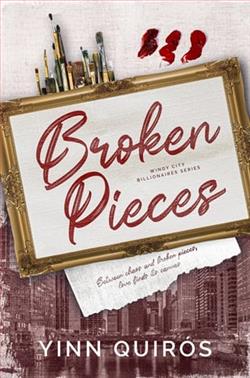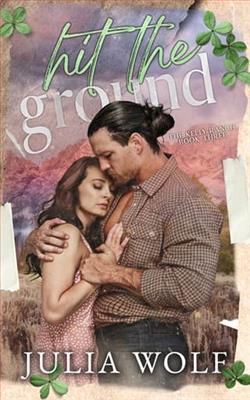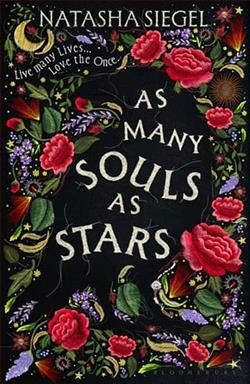Page 59 of Wandering Wild
We sit like that for a long time; long enough for the fire to dry our clothes and burrow into our skin, chasing away the frost of the river, both of us holding each other in silence. Until, finally, I can’t keep quiet any longer.
“You stopped breathing.”
The words leave me in a whisper.
“I’m sorry,” Zander says.
It’s the most outrageous thing I’ve ever heard, and it’s enough to have me jerking in his arms and tilting my head back to look at him. Sure enough, his face is full of remorse.
“You can’t apologize fordying,” I state, incredulous.
His eyes hold mine as he replies, “I can apologize for scaring you, though.”
I stifle my automatic urge to tell him he’s wrong, that I wasn’t scared. Because we both know the truth—I waspetrified.
Softly, Zander goes on, “Thank you for saving my life, Charlie.”
I have to shut my eyes at the tenderness in his voice. It doesn’t feel right to wave his gratitude aside with a trite response like “You’re welcome,” so instead I ask, “How are you feeling? Are you in much pain?”
He grimaces, which is answer enough. “Nothing I can’t handle.”
I touch my hand lightly to his chest, right over where I did my compressions. The bandage he so diligently wrapped around my palm earlier is gone, stolen by the river, but I meant what I told him about it being unnecessary. I can’t feel the wound at all now that the thorn is out. Zander, though...
“Seriously, did I hurt you?” I press. I wouldn’t take it back, but I’ll still feel bad if I cracked any of his ribs.
Zander curls his hand around my fingers, trapping them in place. “I’m a little bruised, but it’s my throat and lungs that are hurting the most. I must have coughed up the entire river.”
“And then some,” I say, remembering how much liquid came out of him. I reach for the fig branch, plucking off some fruit and holding it out. “The juice should help.”
He doesn’t look eager to eat, but when he notices my concern, he forces some figs down. Relief touches his features almost instantly, and his voice is much stronger when he speaks again. “Where did you learn CPR?”
His question is innocent enough, but there are two answers I can give him, one easy, one... less so. I start with the easy one. “My boss, Sandy, makes all of their employees take an annual first-aid course because we work with children. There’s no harm in being prepared, as Sandy always says.”
Zander makes a humming sound of agreement and leans his head back against the wall, his hand resuming its path up and down my arm. I wonder if he knows he’s doing it—or if he’s realized we’re warm enough now that we no longer need to share body heat to stave off the cold. I could move away from him. Ishouldmove away from him.
I don’t move away from him.
Instead, I take a risk, and share, haltingly, “But that’s not where I learned it. My—My mum taught me. She was an ER nurse, and since I grew up in a coastal town, she saw so many drownings that she refused to let me go to the beach with my friends until we all learned how to do it.”
Zander’s hand freezes at the mention of my mother. But then he relaxes again, as if trying to keep me at ease.
Unable to stop myself, I ask, “What you said earlier, about—about your parents... is it true?”
For a long moment, Zander doesn’t answer. I wonder if I lost my chance to hear his truth by not being willing to listen when he wanted to share it with me, and my heart shrivels in my chest. But then he leans across to where his coat is drying beside the fire and unzips a pocket to retrieve something, before resting against the wall once more.
I recognize what’s in his hand: it’s the photograph I’ve seen in the media, the one of Zander fishing with the man and woman who I always assumed were his relatives but not his parents, given that I thought his mum and dad were pictured with him at his movie premieres. But now that I know more about his history...
“Are they your birth parents?” I ask quietly, touching the picture. It’s laminated, but it has enough wear that I can tell Zander carries it with him at all times.
“It’s the last photo I have of them—taken the last day I saw them alive,” Zander says, his eyes on the image. “We were on our way home from a camping trip when we collided head-on with a car that swerved into our lane. The driver was seven times over the legal limit, and she still managed to walk away mostly unscathed. But my parents—” His throat bobs. “My parents died on impact.”
I suck in a breath. “Zander,” I whisper, but I say no more. There’s nothing more Icansay, my own grief hitting me anew. It was the worst experience of my life to have one parent stolen from me—I can’t imagine how he survived losing both of his, and at such a young age.
He lifts the hem of his thermal shirt, and at first all I can see is the bruising that’s already forming from my compressions, but my guilt is diverted when he runs a finger along a scar traveling vertically down his side. It’s long—about the length of my hand—but faded enough that I’ve never noticed it during the times I’ve seen him shirtless, both in person and on-screen. Then again, I’ve also never been this close to his bare torso before.
“Glass from the passenger window,” Zander explains. “Thirty stitches.” I flinch, even as he goes on, “I don’t remember the pain—I just remember being told my mom and dad were gone, and then all I felt was numb.”
I know all about that.















